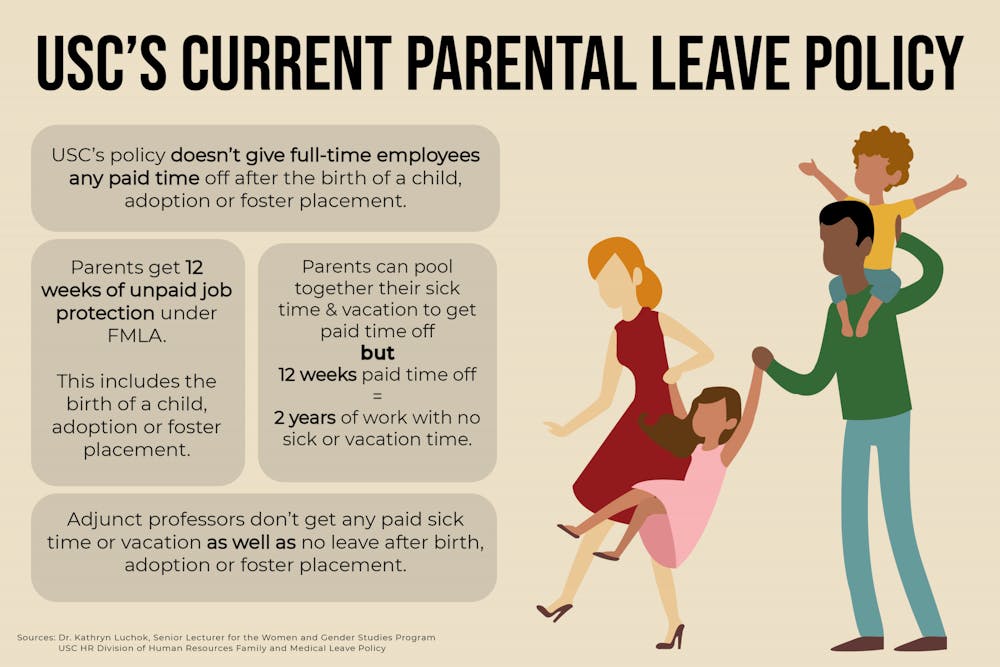The state of South Carolina doesn't offer paid parental leave. We can change this shortcoming by passing S.11, a bill in the S.C. legislature that would give state workers six weeks off and create a better work environment for parents.
There's an adjustment period after a mother gives birth or parents adopt or foster a child.
Newborn babies need round-the-clock care, the mother needs to recover from giving birth, which is one of the hardest things a body can go through. Adopting a child means your life is changing forever and you need time to process it. When you foster a child you need to build that trust with them.
How are you supposed to do that if you can't be around them because you can't get paid time from work?
Because of state policy, the University of South Carolina doesn't give any paid time off but it does give up to 12 weeks of unpaid time to full-time employees and staff members per year depending on how much sick and vacation time they have saved up. That is 12 weeks of no pay, with the added cost of a new human to take care of.
This unpaid leave policy is only for full-time employees or staff members that have worked for the university for 12 months. Adjunct professors, for example, get no time off.
S.11, which was passed unanimously by the S.C. Senate Finance Committee on Tuesday, would give six weeks of paid parental leave to all state workers and to everyone at USC. A bill from last year's session, H.3560, would have offered 12 weeks of paid time off, but was reduced and changed to the S.11 bill so that it would have a chance of passing.
If the bill passes the Senate, it would still have to be approved by the S.C. House of Representatives and signed by Governor Henry McMaster.
Paid parental leave is essential, especially for the mother's health.
Catherine Flowers, who is pregnant with her second child, is part of the Provost Advisory Committee for Women's Initiatives (PACWI) that is now focusing on advocating for S.11 to pass.
When she gave birth to her first daughter a few years ago, she was faced with the choice of going back to work just six weeks after she gave birth or losing her pay and insurance, she said.
"I knew it was coming because I saw the writing on the wall with how much leave I had saved up by that point, but the reality of the situation, living it, was so different from anything I could have planned for," Flowers said. "At three weeks postpartum, you're really physically in no shape to do much of anything except try to keep this little person alive. And also, you're still so much recovering yourself, physically."
Flowers also said with the help of other co-workers and supervisors, she could get about ten weeks off through donated leave, yet it still wasn't enough, and she suffered through postpartum depression.
Postpartum depression is an issue that affects some new moms after giving birth, causing severe depression, trouble bonding, anxiety and trouble sleeping — among other things, according to the Mayo Clinic. Adding on the stress of having to leave your baby to go back to work while you're still recovering from a body-alternating experience can be challenging for new mothers.
Many professors who come into their professional field are often in their child-bearing years, leaving women in South Carolina having to choose between having a baby and having a career.
"I think that the way that you frame it can rob women of the opportunity to have the fullest lives and to fulfill their potential," said Sarah Barnett, an academic advisor in the Honors College and a scholarship and merchandise coordinator. "Because often it's like, oh well, you know she decided to start a family, and then it's like, oh cool, then I guess she doesn't get to work."
Barnett works alongside Flowers at the PACWI and has put having a baby with her partner on hold because she has to wait to accrue enough leave. Barnett also recently adopted a 16-year-old and couldn't take paid time off for that adjustment.
Having to sacrifice either a family or a career is seen all across the United States.
Dr. Kathryn Luchok, an instructor of women and gender studies at the University of South Carolina, said she delayed coming to the university for a year after getting her position because she hadn't acquired any sick or vacation time.
"My son was gonna be born in June, and I would have been starting a position that August. I looked at what maternity leave I would have, and there was none here at the university at all, nothing," Luchok said.
It's important to note the University of South Carolina is not able to give paid leave to employees under law, Flowers said.
"This is really not a case of the university saying, 'No we're not going to be offering you leave.' It's really, it's very complicated with state law," Flowers said.
While S.11 would be a step in the right direction, it's just a start. Six weeks is nowhere near enough time for families to recover after a child is born, and there needs to be more effort to get more time off for these families.
People need to remember that most new parents cannot go 12 weeks without being paid — they need income, but they also need to put their children first.
As students at a university with state employees, we need to keep fighting to get a more extended parental leave policy that would give new mothers and fathers the right amount of paid time off before returning to work.
South Carolina residents can email their senators and ask them to support this bill here.

